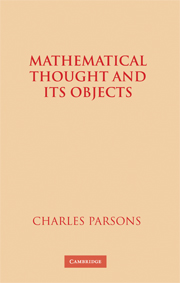2 - Structuralism and nominalism
Published online by Cambridge University Press: 24 November 2009
Summary
The structuralist view of mathematical objects
In order to focus on problems concerning mathematical objects, I turn now to what I call the “structuralist view” of them. By this I mean the view that reference to mathematical objects is always in the context of some background structure, and that the objects involved have no more by way of a “nature” than is given by the basic relations of the structure. The idea is succinctly expressed by Michael Resnik:
In mathematics, I claim, we do not have objects with an “internal” composition arranged in structures, we have only structures. The objects of mathematics, that is, the entities which our mathematical constants and quantifiers denote, are structureless points or positions in structures. As positions in structures, they have no identity or features outside of a structure.
Views of this kind can be traced back to the end of the nineteenth century, and the structuralist view in the sense I intend is an ontological conception that particularly fits the abstract mathematics that came into being in the late nineteenth century and has flourished in the twentieth. The statement that mathematics is about, or primarily about, structures is a frequently offered rough description of this character of modern mathematics. With reference to mathematics, the term ‘structuralism’ is often used to refer to no more than this rough description, or to a conception that expands on it in a different direction from what I have in view.
Information
- Type
- Chapter
- Information
- Mathematical Thought and its Objects , pp. 40 - 79Publisher: Cambridge University PressPrint publication year: 2007
